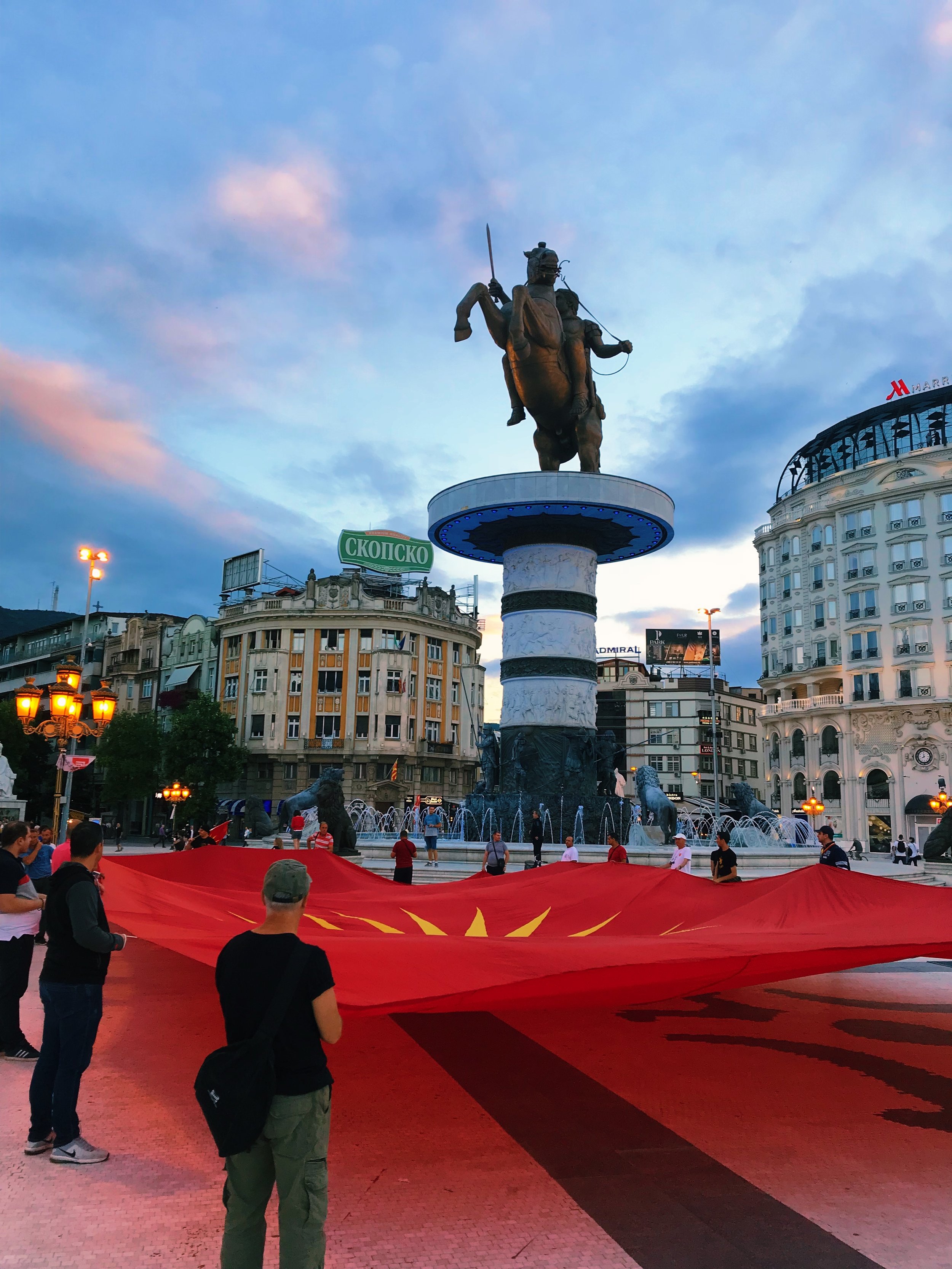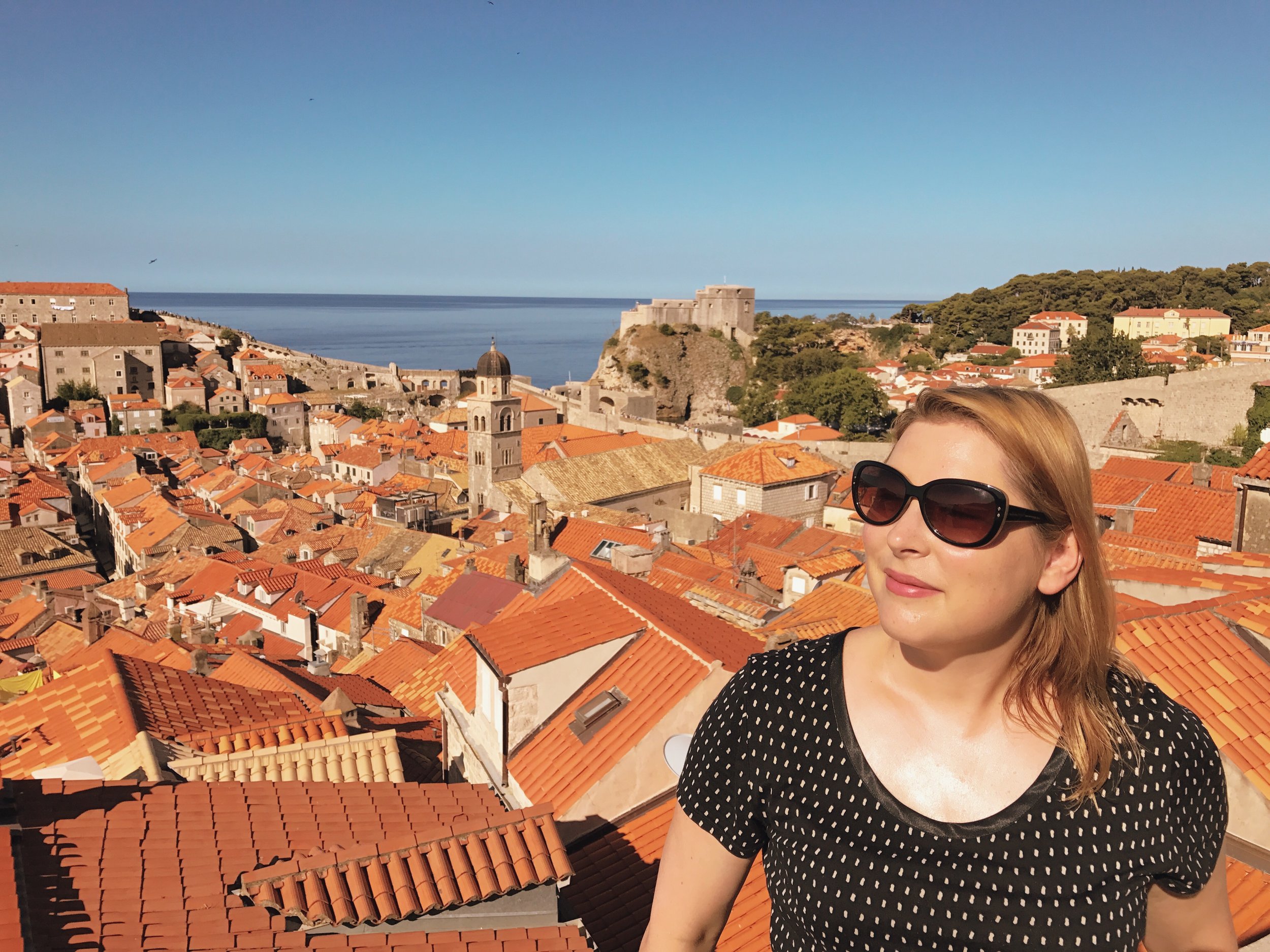Macedonia Name Change: What is This All About?
Protesting Macedonia's potential name change in Skopje, the country's capital. in front of the 'Alexander the Great' statue.
[UPDATE: In January 2019, Macedonia’s parliament agreed to change the country’s name to North Macedonia. Greece’s parliament has approved this, and this agreement will make it easier for North Macedonia to join NATO and the European Union.]
Macedonia, home of about 2 million people, has been in the news lately because it might actually change it’s name. Why? Greece has been pushing them to do this for 27 years and will continue to block Macedonia's applications to NATO and the European Union until they do.
Most of the world recognizes Macedonia by the name Republic of Macedonia. Greece definitely does not and pretty much says they own the rights to the name Macedonia; they have a region in its north with that name.
Once upon a time, there was a Kingdom of Macedonia, which started in present-day Greece. You’ve probably heard about Alexander the Great, the warrior who conquered the Persian empire? His father was Philip, King of Macedon, and Alexander inherited the throne from him after being raised a prince who was taught by Aristotle.
Alexander expanded the Ancient Kingdom of Macedonia well beyond Greece, all the way to India, in fact.
Historically, the geography known as Macedonia today has had that name for hundreds of years. But it’s different than the ancient Kingdom of Macedonia from Alexander the Great’s time. When the Romans arrived, they called a large region of land Macedonia, and this included today’s Greece and Macedonia.
The Romans ruled for a few hundred years and so today’s Macedonians, mostly dependents of Slavic people, say, “This has been the name of this area since ancient Roman times, so why won’t Greece back off?” And Greece claims that Macedonia, which they call the Former Yugoslav Republic of Macedonia (FYROM), is threatening their territory by calling itself simply 'Macedonia' and is also trying to usurp its history.
Hundreds of years of occupation
For most of its history, the Republic of Macedonia was occupied by other kingdoms, including the Ottomans for 500 hundred years, which is why you’ll see such a Turkish influence.
But as the Ottoman’s power wained, other countries in the area, like Serbia, gained their independence from them and banded together to kick the Ottomans completely out of the region, which they did in 1912. Bulgaria, Greece, and Serbia then split up that Ottoman land, including present-day Macedonia, for themselves.
Fast forward to the formation of Yugoslavia after World War II, and a specific area called Macedonia is carved out as one of its republics, in part to balance out the strength of Yugoslavia's Serbian republic.
After communism fell and Macedonia declared its independence in 1991, most countries recognized its new name Republic of Macedonia. Greece doesn’t want this name recognized, and pushed the UN to acknowledge the country only as FYROM. As mentioned, Greece has blocked Macedonia’s applications to NATO and the EU, and in the 1990s, imposed sanctions that really hurt Macedonia’s economy.
This name argument has been going on for nearly three decades, but leaders of Greece and Macedonia recently came to an agreement on a potential new name for Macedonia: the Republic of North Macedonia. I’m not sure the logic of this because that name still includes the hotly contested word, Macedonia.
There have been protests in both Greece and Macedonia about this, and this name change requires a vote by the people. I highly doubt they will agree to this. Macedonians have told me that another nation has no business telling them what they can call themselves, and they don’t really care if this means they can’t join the EU. If the EU doesn’t want us, fine. And Russia would love it if Macedonia doesn’t join NATO and there’s evidence that they are provoking fights about this, so the Facebook wars continue on a global scale.
Skopje 2014
A few years ago, Macedonians top politicians, now facing charges of corruption, launched a redevelopment plan for Macedonia’s capital city, Skopje. The plan, called Skopje 2014, but is still ongoing, was supposedly a job creator and a way to boost national pride and identity, as well as promote the city. If you meet a local here they will likely tell you this was a criminal waste of money that turned their downtown into Vegas on steroids.
You’ll find fake pirate ships, a triumphal arch and other towering monuments and statues and new buildings. Plus buses that resemble London’s double deckers and copies of other cities’ icons.
Existing buildings have new facades to make them seem more historical, but that give them the look of suburban shopping malls trying to be fancy. To be fair, it’s not like they were tearing down ancient buildings because most of Skopje was destroyed during a 1963 earthquake.
Hundreds of millions of dollars have been spent on Skopje 2014, and, with 30% unemployment, residents say this is ridiculous. What’s more controversial is the 72-foot statue of Alexander the Great, plus those of his father and mother. The statues don’t have their names — Alexander’s statue is officially known as ‘Warrior on a horse’ — but everyone knows what this is supposed to represent, a tie to the past that some say is legitimate and others say is not.
Macedonians were so ticked off at the price tag that they protested and threw the corrupt government out of office. “The country is now stuck in an identity crisis,” says Foreign Policy magazine. “Authorities would prefer to emphasize Macedonia’s role in Western antiquity, which they see as a key component of its rivalry with Greece, while many Macedonians say they see their heritage in the Slavic Byzantine history of the ninth century, which produced saints like Cyril and Methodius, not world-conquering men on horseback.”
Also, Macedonia is made up of 1/4 ethnic Albanians, who say they’re not represented at all in these redevelopments.
And so that’s just another reminder that we are not our governments, and when we talk about what Greece wants or what Macedonia wants, we’re often talking about what leadership wants, not the men and women on the ground.
If you found this article useful, please share it, and subscribe to the Postcard Academy podcast. Each week, expats and adventurers share their insider travel tips on the best food, nightlife, and cultural experiences in the most interesting places around the globe. I’m your host, Sarah Mikutel, an American who's spent the last 7 years living in, and traveling around, Europe.


